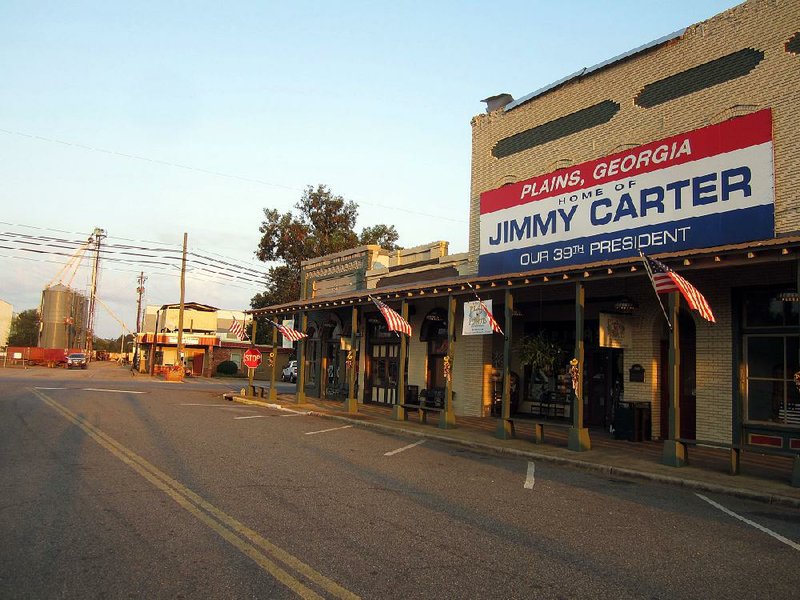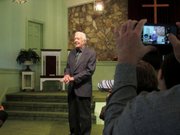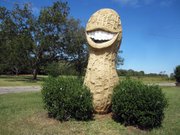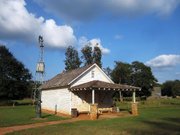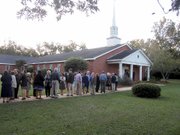While driving through southwest Georgia last fall, I drove past a cotton field, a crop so loaded with historical significance that I couldn't help but stop the car and gape at the scraggly plants. Evocative as they were, they weren't the day's main agricultural attraction. That honor went to the peanut, a crop that symbolizes a different period in American history -- a four-year period, to be exact.
I am, of course, referring to the administration of President Jimmy Carter, the erstwhile peanut farmer from Plains, Ga., who burst onto the national political stage in 1976, wooing the electorate with born-again, can-do spirit.
WHERE TO STAY
Plains Historic Inn
106 E. Main St., Plains, Ga.
(229) 824-4517
This gem of a hotel is above an antique store on the town’s main strip. The inn’s seven suites are themed by decade (1920 through 1980) and are tastefully decorated with furnishings from each era. Rooms fill months in advance, so plan ahead. Rates for Friday and Saturday start at $125.75.
WHERE TO EAT
Bobby Salter’s Plain Peanuts
128 Main St., Plains, Ga.
(229) 824-3462
Graze through a variety of peanut products and pick up a “Went nuts in Plains, Georgia” T-shirt at this downtown gift shop, where the peanut butter ice cream is famous and the boiled peanuts are warm and salty. Boiled peanuts start at $3, T-shirts cost $12.99 and souvenirs start at $3.
WHAT TO DO
• Maranatha Baptist Church
148 Georgia 45 North, Plains, Ga.
(229) 824-7896
The good word of the Lord — and President Jimmy Carter — rings forth from the pulpit most Sundays in Plains. Check the church website for Carter’s availability. (Forthcoming scheduled dates include March 4, 11 and 18). Sunday School starts at 10 a.m., but visitors are advised to arrive as early as 6 a.m. to get a seat. Attendance at church afterward is required.
• Jimmy Carter National Historic Site
300 North Bond St., Plains, Ga.
(229) 824-4104
The National Park Service oversees three locations from Carter’s life. Stop by Plains High School, where Carter was a student, for an overview and orientation. Next, head downtown to the Train Depot Museum, from which Carter ran his 1976 presidential campaign. And set aside a few hours to take a tour, see farm animals and explore a multitude of outbuildings at the Jimmy Carter Boyhood Farm, where Carter lived from age 4 until he left for college.
• Jimmy Carter smiling peanut statue
114 Georgia 45 North, Plains, Ga.
The Indiana Democratic Party created this 13-foot, grinning goober as a prop for Carter’s 1976 presidential campaign. Today, it sits in the Plains MTD convenience store’s parking lot, just down the street from Maranatha Baptist Church.
INFORMATION
Perhaps it was because of my grandparents -- Texans whose lives hew closely to the edicts of their Baptist faith -- that I felt compelled to attend Carter's Sunday School class in October while in the state for work. (Or because I'm a fan of presidential history who couldn't imagine passing up the chance to see an ex-president in such close quarters.)
Plains is a paean to the 39th president: Visitors can tour Carter's childhood farm, see the old train depot that he used as a campaign headquarters and stop by his high school, which is now the Jimmy Carter National Historic Site's museum and visitor center. In a convenience store parking lot, there's even a 13-foot grinning peanut that vaguely resembles the president and rivals Carter as Plains' best prop for group shots and selfies.
I arrived at Carter's childhood farm in the evening hours after the close of business and before dusk, when a rural stillness permeated every aspect of the place. The farm was not actually in Plains, but in what was once a small and impoverished black community called Archery, where Carter, who came from a relatively progressive family, formed friendships with black playmates and where abandoned buildings stand empty today.
During the same era, young Carter sold boiled peanuts -- soft like chickpeas, with a salty flavor similar to that of canned green beans -- in town for 5 cents a bag. I was reminded of my own grandmother, who grew up working on her family's peanut and cotton farm. Like Carter, she sold crops in town. The data points that defined her life -- Baptist faith, rural Southern upbringing -- were part of a shared heritage that came to life among the site's outbuildings, in better-preserved versions of her own long-deserted farm.
Journalists covering the Democrat during his candidacy often stayed in nearby Americus, Ga.; I followed their lead. Plains' only hotel was full, no doubt due to Carter's class, which is attended largely by outsiders who begin arriving at an uncivilized hour to ensure themselves a seat. I pulled into the Maranatha Baptist Church parking lot at 5:45 a.m. and received a scrap of paper indicating that I was the 13th car. We pilgrims were hours out from Carter's 10 a.m. lecture, and there was little to do except doze and gaze at a sky of brilliant countryside stars. Faint Southern voices murmured in the dark as a member of the Secret Service walked a dog beneath a row of pecan trees. Soon after daybreak, we lined up on the church lawn based on our numbers.
We would all have an opportunity to take a photograph with the former president and first lady after church, and a steward named Jan drilled us on protocol. No touching! No hugging! No talking to the president! We filtered past a Secret Service checkpoint, found our spots in the pews, and after church officials gave an orientation Carter finally emerged, plain as day, with a cheerful "Good morning, everybody."
Framed against the church's mint-green walls and treading its moss-colored carpeting, Carter, who wore a sport jacket and bolo tie with a turquoise medallion, began by asking the assembled where we were from.
Minnesota. Peru. Texas. Russia.
"D.C.!" I called out.
"Washington, D.C., I used to live there," Carter stated matter-of-factly, and the room roared with laughter. We hung on his every word, still amazed at our luck at having an audience with a man of such power and palpable goodwill. The mood was amplified by the fact that it was his 93rd birthday.
While Sunday School lessons generally focus on ancient happenings in the Middle East, Carter's opened in North Korea -- specifically on his hope for peace. His lesson, derived in part from Paul's Epistle to the Galatians, centered on free will and God's unconditional love, regardless of the good or bad decisions people make.
Carter also touched on the parable from Matthew that tells of the crowd of laborers who famously began work at varying hours but all received the same wage. "That parable has a lot of connotations -- one connotation in it is that it treats everybody the same. We're all the same in God's eye," Carter said. It was a powerful message coming from a man who has spent his post-presidency carrying out humanitarian work around the globe.
Parishioners at Maranatha Baptist Church recommended one of the town's main eateries, the Cafeteria, which has since closed but represents a type of restaurant found throughout small towns in the region. Most of the congregation arrived before me and raided the place of its fried chicken, leaving me with meatloaf. It was snuggled onto my plate next to a great Southern trifecta: black-eyed peas, collards, and macaroni and cheese. This was accompanied by a towering Styrofoam cup of sweet tea, a potion so saccharine I was forced to go back and sheepishly ask for water.
I was, after all, trying to save a little room for some peanut butter ice cream, which is sold at Carter's former peanut warehouse. Today, it houses a tourist shop where visitors can buy T-shirts in every color, featuring a goofy-looking goober and the saying: "Went nuts in Plains, Georgia." I didn't get one, but I did buy ice cream and a cup of boiled peanuts ladled from a simmering pot.
As Carter had said in Sunday School, we are free to make choices, good and bad. Certainly, my choice to come to Plains had been a good one. That said, the weekend's gold standard for good seemed to rest with the calm and simple decency of a man who spends his Sunday mornings spreading a message of love and kindness.
Travel on 02/18/2018
